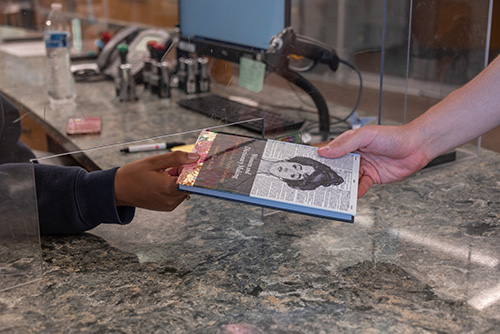The start of the semester can bring a variety of stressors, but one that Michigan State University Libraries is helping to mitigate is the high cost of course materials for both students and faculty.
For the last several years, the MSU Libraries have offered an increasing number of classroom resources to students enrolled in courses at MSU at low or no cost. Both electronic and print materials are available to students through the Course Reserves program. Course reserves are textbooks put on hold at the MSU Libraries by professors, allowing students to borrow or share classroom resources rather than having to purchase them. The Libraries also makes a concerted effort to identify and purchase required materials that are utilized by MSU classes from its collections funds. A recent significant collections acquisition was the Libraries’ subscription to Cambridge University Press’ electronic textbook package, which provides access to over 1,000 Cambridge textbooks. While the Libraries selects electronic formats whenever available, print materials can be found at the Main Library or William C. Gast Business Library. Last year the Libraries offered over 2,600 books for more than 1,015 classes at MSU through Course Reserves. More than half of these titles were provided electronically. MSU Veterinary Nursing Program Director Taylor Epp cited the impact of these low-cost options for students in the College of Veterinary Medicine.
“As a medical professional program, the textbooks required for our courses can be quite pricey,” Taylor said. “Having the textbooks placed on reserves in the MSU Libraries is a wonderful way for students to gain access to a course textbook without having to purchase the textbook themselves.”
Students and faculty can also find several cost-effective course materials outlets through the MSU Libraries’ Open Education Resources Program. Open education resources (OER) include teaching, learning and research materials that live copyright-free in the public domain or have been released under an open license that allows for reusing, revising, remixing, retaining and redistributing them. The Libraries’ OER Program, which was implemented in 2019, aims to reduce educational costs by providing free or low-cost learning materials; encouraging and supporting the adoption, adaptation and creation of OER and other free and low-cost materials such as textbook alternatives; providing multidimensional support for instructors to implement OER in coursework; and empowering instructors to engage in new pedagogical models made possible by OER and the open education approach. In 2022-23, the OER program had an estimated $1,507,600 in cost savings for 15,076 students enrolled in OER courses, with 126 participating instructors. MSU Libraries also offers an OER Award Program for instructors interested in adopting, adapting or creating OER that provides financial, technical and other types of project support. Applications for the 2024-25 OER awards will be open from Sept. 3 to Oct. 11, 2024. The call for applications and application forms will be available on the Libraries’ Online OER Guide after Sept. 3.
The MSU Libraries’ Course Materials Program is another low-cost course pack alternative to resources like textbooks. All materials sold to students are produced at cost on a nonprofit basis. Course packs are available in both printed and electronic format and sold through partnering bookstores and MSU’s D2L platform. This program also provides faculty with research, referrals, and production support for course packs, online library resources and contacts within the Libraries. MSU College of Nursing Senior Instructor Kathy Forrest spoke about the support that Libraries liaisons like Health Sciences Librarian Jessica Sender can provide through these types of initiatives.
“I have worked with Jessica Sender in her role as library liaison in the College of Nursing since 2016,” Forrest said. “As a faculty member, she is my first contact when preparing a course for the next semester. She is quick to provide updates to the library folder in D2L to assist students with resources, literature search tips and exemplars for APA formatting. When developing new courses or making major course revisions I have contacted her to assist with textbook suggestions, student resources and library materials specific to the course’s content and outcomes. Jessica is a highly knowledgeable library liaison and a consummate professional, advocating for nursing students and faculty. I couldn’t ask for a better faculty partner to educate nursing students for the future.”
This story originally appeared on the MSU Libraries website.
